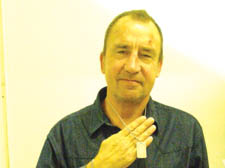|
|
 |
| |

Lenny Rodgie shows the ID tag that would provide crucial information to those coming to his aid in the event of a seizure |
Lenny plays guinea pig in bid to beat epilepsy
Sufferer puts his health on line during drug trials in bid to beat seizures
WHEN neighbours of Hampstead art historian Professor Lee Johnson tried to understand his gruesome death at the hands of his son Michael in 2006, they blamed heavy doses of drugs prescribed to treat epilepsy.
In July this year the 49-year-old was sentenced to indefinite detention under the Mental Health Act following his conviction for manslaughter after battering his father unconscious and leaving him to die in a house fire.
The story is a familiar one to Lenny Rodgie, who at 10 years old experienced his first epileptic seizure and has been misunderstood by school friends, teachers and colleagues ever since.
The former builder, who lives in Delancey Street, Camden Town, is resolute in his belief that it is not the medication or the illness that causes behaviour disorders.
“None of it has anything to do with the drugs,” he said this week.
“I’m not saying that no one would be affected this way, but believe me those drugs only knock you out.”
In the experience of Mr Rodgie, 58, who chairs Delancey Studios’ tenants’ association, the medication available to people with epilepsy is a vital lifeline. He represents a 15 per cent minority of epilepsy sufferers who are epilepsy medication resistant, and has been the subject of eight drug trials in the past 10 years.
Although he has tried dozens of different treatments, including phenobarbitone, mysolene, lamotrigine and zorontin, drowsiness has been the only side-effect he has suffered.
As a volunteer for The National Society For Epilepsy, he has passed a Criminal Records Bureau check and is by his own account a characteristically gentle man, protective of the people he loves.
When Mr Rodgie fails to take his medication his seizures and absences develop into fits.
Professor Matthew Walker, of the National Hospital for Neurology in Queen’s Square, conducted an operation on Mr Rodgie’s brain in 2006, which carried a small risk of blindness and paralysis.
Since then, the “clusters” of seizures he had previously experienced have gone away.
“Everyone said how brave I was. But it wasn’t bravery, it was desperation,” he said.
Prof Walker does not think of epilepsy as a disease but as a symptom of other problems, whether a head injury, alcohol abuse, or a natural pre-disposition for disturbances in brain activity.
He said: “There has been talk of the drugs causing people to become violent, but the evidence for that is slight. In my experience of people with epilepsy, they’re vanishingly few who have any history of violence.”
Prof Walker estimates a 70 per cent success rate among his patients who become seizure-free through medication.
Half of these patients will be able to eventually stop taking drugs altogether.
Prisoners represent a high proportion of epileptics and depression and suicide rates are considerably higher in those prone to repeated seizures.
But the fact that the cause of epilepsy can be attributed to experiences suggests the condition is as much the result of imbalance as a cause of it.
“Epilepsy is sometimes caused by conditions themselves that sometimes lead to depression and injuries,” said Prof Walker. “The drugs can sometimes make that depression worse.”
|
 |
|
| |
| |
| |
| |
|
 |
|